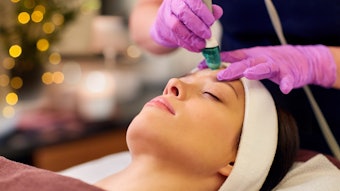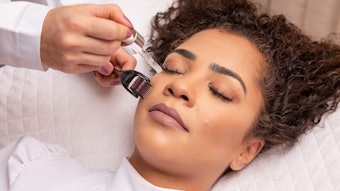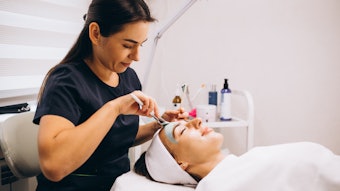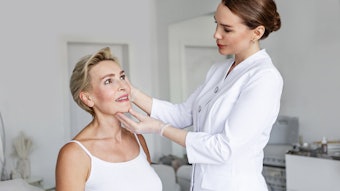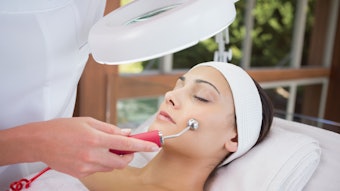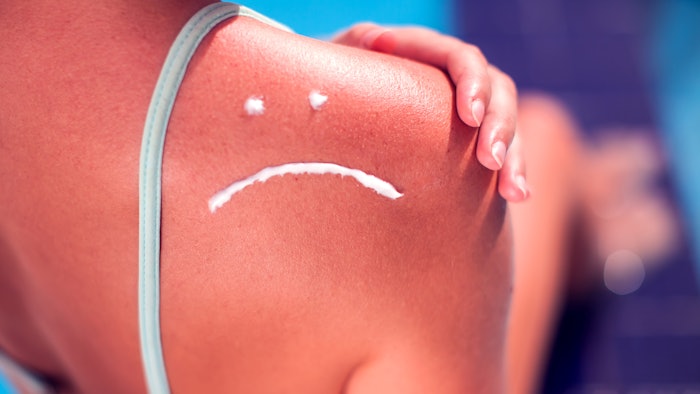
With summer rolling in, it's crucial to educate your clients on the importance of applying SPF protection daily. While estheticians know that sunscreen should be an essential product used year round, it's especially critical during the months where UV exposer will be at its peak.
The National Library of Medicine revealed statistics regarding sun protection and skin cancer that many will find shocking. Their study assessed the general knowledge of United States citizens on sunscreen use, frequency of usage, common behaviors of sunscreen usage, and use of sunscreen based on knowledge of sun protection.1 The statistics include:
- One in five Americans will develop skin cancer before the age of 70.
- 11% of the participants reported not wearing sunscreen at all.
- 13.5% of the participants wear sunscreen daily.
- 87% of the participants do not wear sunscreen daily
- 66.5% of the participants believe that sunscreen education should be included in schools.
It is clear to see that there is an urgent need for sun protection education in the U.S., and skin care professionals hold a responsibility to help their clients understand the long-term effects and possible dangers of not using sunscreen daily. In this article, we spoke with credited professionals in the field, Dr. Kristen M. Jacobs of Ooh La La Spa and Katie Matten, RATIONALE Resident Principal Facialist and Global Head of Education, on how professionals can provide proper SPF support, how to recommend the right sun care products and how clients can protect their skin year round.
How To Convince Clients to Wear SPF Daily
Spa professionals carry the unique position of being able to make a direct affect on their client's SPF usage and sun protection. In order to help your clients start to proactively take precautions against the harsh effects of the sun, you need to make sure your clients understand the dangers of not applying daily SPF.
While it may be surprising to a skin care professional, it is very normal for first time-clients to not know that they need to wear sunscreen daily outside of on vacation or at the pool. Dr. Jacobs recommends that estheticians should focus on education and asking clients what they are currently using in their skin care routines, including a direct question about SPF usage.
"Most people know wearing sunscreen is good for you, they just need some direction in choosing one that’s right for their skin and day-to-day life. To convince my patients to prioritize sunscreen and sun protection, I often say to them that if they are taking the time to come in for their skin, that’s only half the battle," said Dr. Jacobs. "If you are investing time, effort and money into your skin, you need to do that at home too. I advise not being pushy, just focus on informing your patient with the knowledge they need to make the choice for themselves."
Related: Top Sun Care Trends in 2024
How to Choose the Right SPF for Your Clients
Just like there is no one size fits all skin care product or ingredient for each of your client's skin, there is also no one size fits all SPF. This means that you, as the professional, need to asses skin conditions and types to help your clients make the right SPF choice. "Sun damage exacerbates all skin conditions, so highlight how SPF can benefit each individuals skin goals. Speak to the important role of SPF in daily routines, and the protection against incidental exposure that clients often overlook," said Matten.
When deciding on an SPF for your clients, there are a few reminders spa pros should keep in mind. Dr. Jacobs shared that she always recommends a physical sunscreen, which will work as a shield to protect the skin from the sun. Chemical sunscreen work like a sponge to absorb UV rays, and many wish to avoid that.
"The way to tell between the two is by looking at the ingredients. In a physical sunscreen, the only active ingredients should be zinc oxide and/or titanium dioxide. Ingredients are key! If you see any active ingredients other than those two, it is a chemical sunscreen that can contain other harmful ingredients," said Dr. Jacobs.
She also reminds clients to pay critical attention to both the active and inactive ingredients for chemicals such as: oxybenzone, avobenzone, homosalate, octinoxate, octocrylene, cinoxate, dioxybenzone, ensulizole, meradimate, padimate O and sulisobenzone, which can be harmful to skin.
Retail Tips for Successfully Selling SPF
SPF has the potential to be the easiest retail product to tie into your services for boosted ROI. While we know the importance of instilling a home care routine and making retail sales for our business, we also know how beneficial this can be for the client. Not only are you making a sale, but you are helping your client start what could be life-changing habits that protect them from possible sun damage or even skin cancer.
Matten often opts for a high SPF rating when pushing sunscreen in her retail offerings. She advices nothing less than SPF 50+, and also reminds clients to consider the texture of the product and how it wears on their skin, as if they don't like the way the product feels, they won't wear an SPF consistently. Finally, she reminds clients of the research behind the product, which will instill confidence in the product and your knowledge as their personal skin care professional.
Dr. Jacobs recommends carrying a variety of sun protection products in your spa, and to always make sure your SPF is in stock, so that it is an easy purchase after their services. Although, she does warn against offering too many options, as that can be confusing for clients; carrying two to three quality sun sunscreens will be sufficient.
Another huge retail opportunity would be carrying sun care products that are tinted or work as a dual makeup product. Tinted sunscreens are trending amongst younger generations, and this multi-use product will service as an easy sell. "By offering a variety of high-quality products with SPF it allows you to personalize the experience for the patient and understand their needs for a product," said Dr. Jacobs.
Universal Sun Protection for All
It is clear that there is a urgent need for not only increased sunscreen usage, but also education that provides users with the dangers of not applying SPF protection daily. It is important for estheticians to use their knowledge of skin health to become the sounding voices in the industry for increased sunscreen usage.
Whether it's in the treatment room, on social media or in the retail space, there are endless opportunities for spa professionals to make every client an everyday user of SPF that understands and shares the consequences of not properly protecting their skin against the sun.
References:
